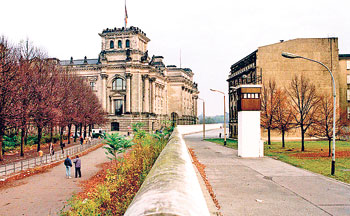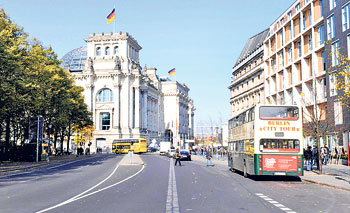BERLIN - Those who witnessed that night 20 years ago in Berlin, or elsewhere in Germany, will never forget what happened - the night the Wall came down.
History in the making is all too often tragic. Only rarely is it capable of irony. November 9, 1989, was one of those rare moments when irony reigned, because East Germany's bureaucratic socialism died as it had lived - with a bureaucratic snafu.
The Speaker of the Politburo, Günter Schabowski, had simply misunderstood that body's decision and, by releasing to the public incorrect information about the lifting of travel restrictions, triggered the fall of the Wall! Groucho Marx could not have bettered Schabowski that night. It was Germany's happiest hour.
Twenty years later, many revolutionary consequences of that night lie behind us.
The Soviet Union and its empire quietly disappeared, and with them the Cold War international order. Germany was reunited; Eastern Europe and the states on the Soviet periphery won their independence; South Africa's apartheid regime fell apart, numerous civil wars in Asia, Africa, and Latin America ended; Israelis and Palestinians came closer to peace than at any time since; and a disintegrating Yugoslavia degenerated into war and ethnic cleansing. In Afghanistan, war continued under different circumstances, with serious ramifications for the region and, indeed, the world.
As the victorious heir to the collapsed Cold War order, the United States stood alone, undisputed, at the peak of its global power. But, within two decades - following the war in Iraq and financial and economic crisis - the US had squandered that special status.
Arrogance of power and blindness about reality were the two main causes for the decline of the sole remaining superpower. While most of the blame lies with George W. Bush, numerous negative trends had preceded him. He merely took them to the extreme.
After September 11, 2001, the US had a second big chance to use its unique power to reorganize the world. After this terrible crime, countries - including in the Arab world - were ready to embrace far-reaching steps. At that moment, peace between Palestinians and Israelis could have been achieved, and thus a new beginning made in the Middle East.
Even a radical about-face in US energy policy, with the introduction of energy taxes, would have been possible under the banner of national security. The challenge posed by global climate change could have been addressed more effectively that way. But that opportunity, too, was thrown away.
Europe - and, within it, Germany - were among the big winners of November 9, 1989. The Continent reunited in liberty: Germany on October 3, 1990; Europe with the great European Union enlargement of May 1, 2004. The introduction of a common European currency was successful; political integration by means of a constitutional treaty a failure. Since then, the EU has been stagnating, both internally and externally. Europe has made only insufficient use of its opportunities since 1989 - and could dramatically lose influence in the emerging power structure of the twenty-first century.
 |
 |
| Combo shows two pictures of the German Reichstag building (back L) one with the Berlin Wall (top) taken on November 10, 1989, and the same view (bottom) taken twenty years later on October 20, 2009 without the wall. AFP |
In Germany, which largely owes its reunification to its firm roots in the EU and NATO, Europe-weariness is palpable. The generation ruling in Berlin today increasingly thinks in national rather than European terms. This was never more obvious than in the deciding days and weeks of the global financial crisis.
Russia, the big loser of 1989, remains two decades later mired in a mix of social and economic depression and political regression and illusion. Life expectancy continues to decline; investment in infrastructure, research, and education are stunted; the economy is barely able to compete internationally; and the social divide between poor and rich is deepening.
Economically, Russia has turned into a commodity exporter, dependant on the imponderables of the global energy market, while simultaneously dreaming that it can use energy as a tool to revise the post-Soviet order in its neighbourhood.
Russia's elites still largely think in the power categories of the nineteenth and twentieth centuries. This constitutes the illusionary and historically regressive element of current Russian policy. Russia's desire to reclaim its role as a powerful global player is understandable and legitimate. But if it turns toward the past in looking for its future, and if it believes it can dispense with investments in the future in favour of shameless personal self-enrichment, it will continue to lose ground.
November 9, 1989, marked not only the end of the Cold War era, but also the beginning of a new wave of globalization. The real winners of this new world order are the large emerging countries, first and foremost China and India, which increasingly set the pace of global economic and political development.
The G-8 has been dismissed by history as a club of Western industrial nations; its place has been taken by the G-20, which conceals the underlying formula of power distribution within the new world order: the G-2 (China and the US). All these changes reflect a dramatic transfer of power from West to East, from Europe and America to Asia, which within the next two decades is likely to bring to an end 400 years of Eurocentrism.
The past two decades also have seen the world begin to reach its ecological limits. The majority of humanity has sought since November 9, 1989, to achieve Western living standards at all costs, overstretching our planet's climate and ecosystems.
The years since the Berlin Wall came down have been rich in dramatic change, but the real era of upheaval lies ahead. Global warming is only the tip of the iceberg towards which we are moving, knowingly, with eyes wide open. What matters now is that states act globally and in unison. Twenty years after Berlin, Copenhagen is calling.
Joschka Fischer, a leading member of Germany's Green Party for almost 20 years, was Germany's Foreign Minister and Vice Chancellor from 1998 until 2005.
Copyright: Project Syndicate/Institute of Human Sciences, 2009. Exclusive to the Sunday Times
|



